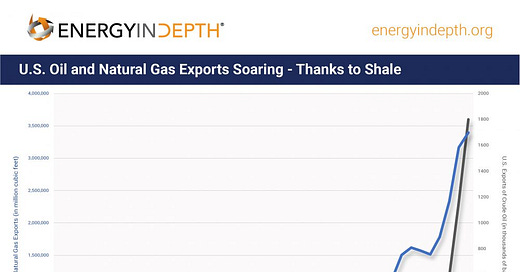Frack the Model Part II
Last week I wrote a post on how fracking dismantled everything we thought we knew about energy.
Today, let’s talk how fracking disrupted geopolitics and led to what is now playing out with the Russia-Ukraine Conflict.
Russia is a petro-state. Oil and gas accounts for 60% of its exports, and it has been among the top three producers in the world for a long time.
Europe is highly dependent on Russian oil and gas. Germany and Finland import two thirds of fossil fuels from Russia.
It is impossible to understand the Ukraine-Russia situation without looking at it through this lens.
Russia is Europe’s largest gas station. Russian pipelines run through Ukraine and across the continent. And Russia always had the ability to turn off the gas in the case that Europe didn’t cooperate.
In the 20th century, this was a pay to play model that Putin could use to exert influence. Russia offered cheap gas in exchange for political cooperation.
And with the world so completely dependent on fossil fuels, this was a powerful strategy to project power across the world.
Only 15 years ago, it looked like this dependency on Russia and the Middle East would never end. Clean tech was a long way a way. And so the West was often forced to work with tyrannical, anti-Democratic states.
But then… everything changed. The models were fracked.
The explosion in fracking technology meant that the United States - previously a net fossil fuel importer - suddenly had so much natural gas that it could export it across the world.
Subsequently, the United States had its own gas station and didn’t need to worry so much about fuel dependencies abroad.
With The Middle East and Russia no longer had as much leverage on the global stage.
Fracking was such a dramatic revolution that the United States is currently on track to become the #1 oil and gas exporter on the planet.
Fast forwarding to the Russian invasion of Ukraine in 2022:
In response to the invasion, Europe and the United States de-platformed the Russian financial system and forced most major corporations to divest away from Russia.
We are currently in the process of a major collapse of the Russian economy.
If Russia is Europe’s gas station and holds so much leverage over the continent’s energy demand, why do European leaders feel that they are in a position to take such drastic action?
(They certainly could not have done this a decade ago)
Look no further than the US energy boom.
President Joe Biden guaranteed European energy security amid the conflict, in case Russia decides to turn off the pipelines.
The fact that the United States is even capable of doing this is directly the result of the fracking revolution.
Fracking is a geopolitical game-changer. It meant that Europe is in a position to divest away from Russian oil
The transition away from Russian oil may still be a bumpy road. But the reality is, once Europe leaves, it will never go back.
The European Union is immensely powerful, and a larger economic zone than the United States. Dependency on Russian oil was one of its major weaknesses.
But this conflict is allowing it to quickly shed that dependency, which will change geopolitics forever.
Takeaways:
-The decline of the west narrative was wrong. Dead wrong. In fact, the West is likely stronger than ever.
-Fracking empowered Europe to use its full economic leverage against Russia, demonstrating that it is far more of a global superpower than anyone ever gave it credit for.
-Environmentalists may hate the fracking boom, but it is acting as a bridge to cut our dependencies from the petro-states.
Personally, I was previously mixed on fracking because of environmental consequences.
I now recognize that it brought an enormous amount of good to the world, and that we have yet to see the full global impact of the United States becoming a net energy exporter.



